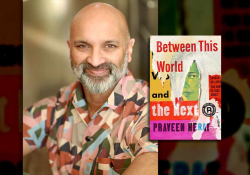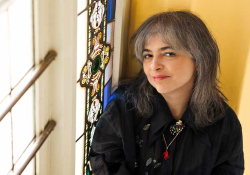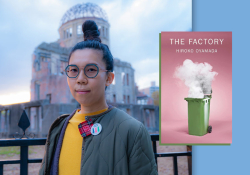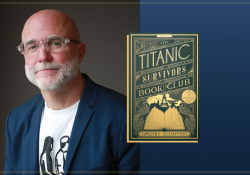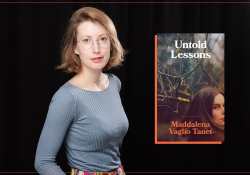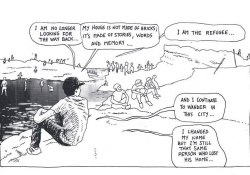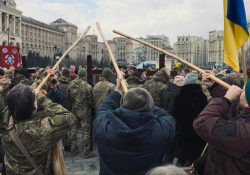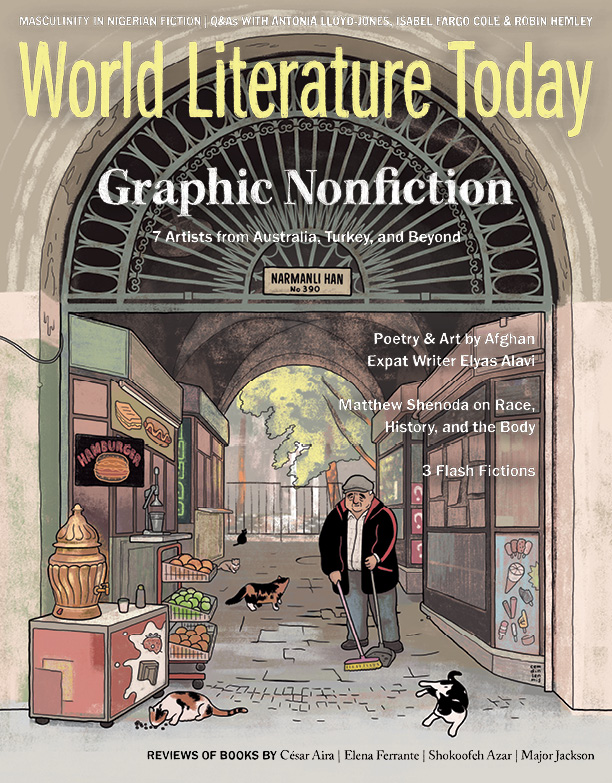Translating History: A Conversation with Isabel Fargo Cole
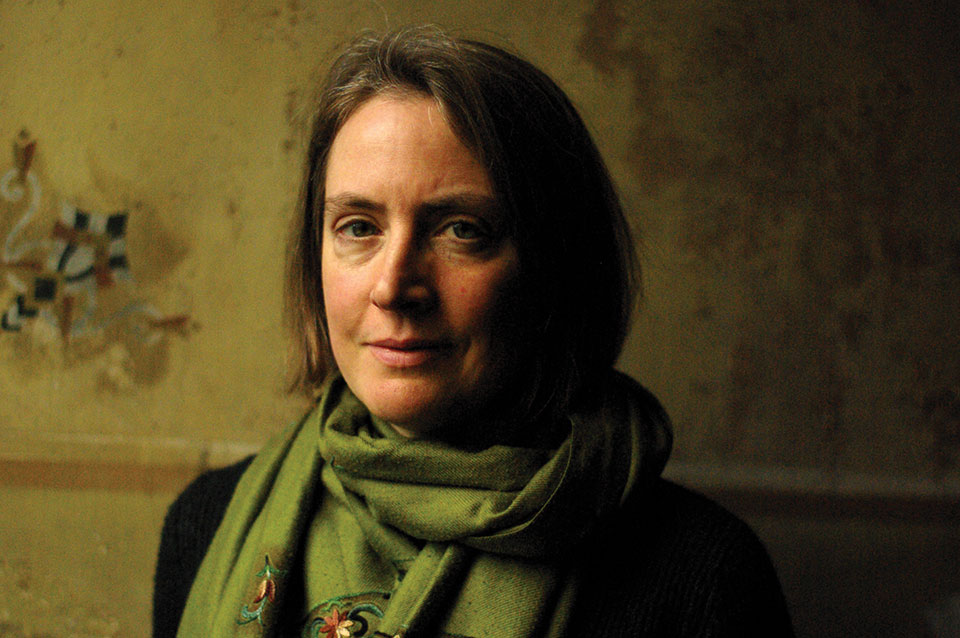
Isabel Fargo Cole grew up in New York City, received a BA from the University of Chicago in 1995, and has lived in Berlin ever since as a writer and translator. Her translation of Wolfgang Hilbig’s Old Rendering Plant received the Kurt and Helen Wolff Prize in 2018, and her other translations of work by Wolfgang Hilbig and Franz Fühmann have been nominated for several awards. Since 2005 she has published short fiction and essays in German. Her second novel, Das Gift der Biene, was published by Edition Nautilus in 2019 and selected for the 2019 LiteraTour Nord, the 2020 Festival Neue Literatur in New York, and the 2020 Literaturlenz in Chicago.
From 2006 to 2016, Cole co-edited no man’s land, an online magazine for new German literature in English. In 2013 she was a co-organizer of the initiative “Writers Against Mass Surveillance.” In this conversation, she and Andrea Bryant consider the roles that historical context, location, and translation play in her writing.
Andrea Bryant: Our last interview concluded with a question about your involvement with Writers Against Mass Surveillance, an initiative that you co-started. I noticed that your novella, Ungesichertes Gelände, revolves around political activists. Would you say that political activism plays an equally important role for your characters in Das Gift der Biene?
Isabel Fargo Cole: A literature professor was just telling me about one of his students who enjoyed the book but was disappointed that the characters “weren’t more political.” The book is set among a community of ex-squatters, so the student might have expected them to be radical activists like most squatter groups in Berlin are now. But in 1990s Berlin, the squatter culture wasn’t always so ideological; it was sometimes just an alternative lifestyle. My characters started their squat in the final year of the GDR as a way of rebelling against the state. Now the new, social-democratic state has renovated the building and let them move back in with subsidized rents. So it’s a kind of modest little utopia where they can have their alternative way of life, and in that sense it is political. But these people have a complicated relationship to political ideologies, because they’ve just experienced the collapse of the socialist state they grew up in, and that has left them with a cynicism about all political systems, yet mixed with idealism about the possibility of finding entirely new ways of seeing things. They love to argue about politics and explore different viewpoints, but they’d be wary of activism.
Bryant: I couldn’t help but notice that after receiving the Helen and Kurt Wolff Translator’s Prize for your translation of Wolfgang Hilbig’s Old Rendering Plant into English, you describe the process of writing and translating differently, with writing having more freedom but less security. Has this changed for you after completing your second full-length novel in German?
Cole: No, it’s in the nature of the thing itself. Translation problems can be difficult (or even impossible!), but the difficulty lies in doing justice to what’s there on the page: the tone, associations, melody, wordplay, and so on. That’s often frustrating and humbling, but you’re never faced with the blank page like you are when you write. You don’t have to figure out what’s going to happen and find a form for it, or how to formulate ideas and construct logics. There’s always something there to work with.
Bryant: Would you say the process would be different if one were to write in a first or third language?
Cole: The blank page is blank, no matter what language you’re writing in. And developing characters, storylines, images, and so on happens mostly on a level below (or above?) language. But the process of finding words and formulating ideas can be different from language to language. Sometimes it’s easier for me to formulate ideas in German; sometimes it’s easier in English. But I’m not sure if there’s any particular logic to that.
The blank page is blank, no matter what language you’re writing in.
Bryant: Do you think it’s a good idea for translators to work in groups or pairs?
Cole: There are some translators who work well as pairs, but I think in general it’s preferable for a work to be translated by one translator so that you end up with a seamless whole and a strong voice.
Bryant: Does the same go for a writer’s collective oeuvre?
Cole: I see it as an enrichment to have different translators’ versions of a writer’s work—each translator has a slightly different take and can reveal different facets of the writer’s voice.
Bryant: The topic of translation is timely, as Das Gift der Biene has received an endorsement by New Books in German, which secures translation funding if chosen for publication by an English-language publisher. Which personal qualities are the most important for a translator to have?
Cole: Translators need to have a real mastery—and enjoyment—of the source language as well as the target language. They need the patience and the focus to read and interpret carefully and to maintain their pleasure in the work through many readings and drafts. And they need the élan to give their translation a life of its own, of course without straying from the intent of the original.
Bryant: I appreciate that you sense both enjoyment of language and élan as essential experiences for translators. How might a potential translator of Das Gift der Biene sustain these qualities?
Cole: Actually, I’d be strongly inclined to translate the book myself, if a publisher would be open to that. I’ve occasionally translated short pieces of mine into English, or vice versa, and it’s an interesting process, somewhere between writing and translating. Images and metaphors and sounds can fall into place differently depending on the language, and when you’re self-translating you can allow yourself that poetic license.
Images and metaphors and sounds can fall into place differently depending on the language, and when you’re self-translating you can allow yourself that poetic license.
And it would also give me the freedom to slip in a bit more background information or rephrase things here and there to make them clearer for an English-speaking audience, though that would have to be subtle. One reason I started writing in German was that my subject matter became very (East) German, and writing about those subjects for an English-speaking audience began to feel like translating and seemed to require a lot of background information that would create a more detached perspective. In 2001, back when I was still writing in English, I once took a story set in Berlin to an American writing workshop and found that a lot of people there didn’t get the story because it hinged on the significance of the year 1989—that date was no longer on their radar. But the narrator was an East German, and it would have been silly to have her say something overly explanatory like “back in 1989, when the Wall fell.”
Now that I have more writing—and translating—experience, I feel better equipped to find subtler solutions for those problems. The narrator of Das Gift der Biene is a young American woman, Christina, who moves to Berlin in the 1990s and becomes obsessed with the stories of her East German friends. She has an outsider’s perspective, but she is very immersed in the German context; when she tells the story she’s trying to figure things out in her own mind, not explain them for an audience back home. I would want to preserve that perspective but maybe slip in a few things to help non-German readers along.
On the other hand, Die grüne Grenze, my debut novel, is set entirely in East Germany and the perspective is East German. (Essentially, it tells some of the stories that are haunting Christina’s friends in the second book and that she is trying to get to the bottom of—the two novels form a diptych, though they can be read in any order.) So it’s interesting to think about what the translation process might look like there with some scope for shifting and reinventing the narrative perspective—especially since one key theme in both novels is what a complex process it is to imaginatively re-create and narrate historical events and things that lie beyond one’s own experience.
One key theme in both novels is what a complex process it is to imaginatively re-create and narrate historical events and things that lie beyond one’s own experience.
Bryant: Which moments of historical discovery were the most central while writing Das Gift der Biene?
Cole: I often discover fascinating stories and facts and philosophies in my research, and one thing I discovered while writing Das Gift der Biene was the tradition of Jewish mysticism. I knew that a miracle rabbi would play a role in the book, so I read several books on the Kabbalah by the philosopher Gershom Scholem, who was originally from Berlin. The Kabbalah is often seen as purely esoteric (and now a bit of a fad), but Scholem points out a lot of thought-provoking philosophical ideas about issues such as language and history. Scholem was a close friend of Walter Benjamin, who was strongly influenced by his work on the Kabbalah, and that influenced other important modern thinkers like Theodor Adorno. That gave me some entirely new perspectives on twentieth-century thought.
Bryant: Would you say that you are able to write about these time periods so well because of extensive literary experience with them, or is there another experience that contributes to this ability?
Cole: Well, for the 1990s I mainly drew on my sense of the time as I experienced it. And for the GDR era I relied mostly on historical research, archival materials, and people’s personal recollections. Literary works from the GDR have definitely helped give me a feel for the atmosphere and psychology, though.
Bryant: Looking at the trajectory of your own German-language work, I couldn’t help but notice the centrality of political context throughout your own writing: from the relationship of two political activists in your novella Ungesichertes Gelände, to the temporal setting of Die grüne Grenze between 1950 and 1998, and to the latter part of the ’90s in East Berlin in your latest novel, Das Gift der Biene. What role does history play in a story’s development?
Cole: I have a strong interest in history, how different layers of history affect the present, and how this plays out in people’s individual lives.
Bryant: What is it about these historical contexts that captivate you the most personally?
Cole: Die grüne Grenze is set in the GDR, which always fascinated me as a vanished country and way of life that I’ve been trying to figure out in retrospect, through other people’s stories. The 1990s in Berlin, on the other hand, are something I experienced myself. But that posed a different challenge—I found myself having to piece together what was going on in Berlin and the world back then, because I couldn’t always rely on my memories. It was a turbulent time: conflicts over reunification, Berlin becoming the German capital and undergoing massive construction and gentrification, the digital age getting underway, the Balkan wars and an influx of refugees, right-wing violence. But when I looked for books about Berlin in the ’90s to give me an overview and help put my memories into context, all I could really find were books about the club scene and so on. It’s funny—the Berlin of the ’90s is such a mythos, so fetishized, but it’s hard to find a serious examination of all the historical developments that got underway back then.
That’s true of the ’90s in general—there was a sense that capitalism had “won” the Cold War, and many of us were complacent and blind and ignoring the darker sides of what was going on. Worst of all, it was a time when we were loudly and clearly warned about the risk of climate change, and maybe could have headed off the crisis if we had taken real action then. But the dynamics of turbocapitalism were too strong. All these things were on my mind, but they’re just hinted at in the margins—I wanted to convey that sense of living in a bubble that in retrospect seems typical of the ’90s.
I wanted to convey that sense of living in a bubble that in retrospect seems typical of the 1990s.
Bryant: I was also struck by the structure of each work: while Ungesichertes Gelände takes on the structure of an epistolary novel set in the early 2000s, the chronological order of Die grüne Grenze appears to be in roughly chronological order, with the 1950s placed in the middle of the 1980s. From the chapter headings, it appears that Das Gift der Biene is set squarely in the mid-1990s in East Berlin without being referenced by time. Is there a reason for these differences?
Cole: The chronological structure just fell into place differently for each work. With Ungesichertes Gelände, I wanted the intimacy of the epistolary form, which fit in with the theme of surveillance and the invasion of privacy. Also, it does interesting things with the perspective and time frame because the narrator is always addressing someone directly, and she’s looking back and describing events that just happened. Then there’s another letter and something else has happened in the meantime. It’s not just a smooth narrative progression.
With Die grüne Grenze, I wanted to explore what happens when people repress traumatic memories behind a façade of normal life. It begins by describing the main characters’ newlywed life in a village in the border zone in the 1970s, with a lot of tensions under the surface. Then there’s a flashback to the 1950s that tells the story of the husband’s childhood and youth and the secrets he’s hiding, and then the narrative returns to the ’70s, all the skeletons come out of the closet, and things get dramatic. If I had told the story in chronological order, the dramatic tension would be different. Also, there’s a novel within the novel that delves into medieval history. The book is very much about exploring different layers of the historical or personal past, and the chronology reflects that.
As for Das Gift der Biene, I thought of it as being something like a classic novella, which for German Romantic writers meant a fairly simple narrative without a lot of subplot but with an “unheard-of event”—namely, a strange or even fantastical twist at the end. So it is a simple chronological narrative. However, it also has interconnections with Die grüne Grenze, referring back to some of its events and picking up some of the fates of those characters.
Bryant: Does this mean readers cannot expect a sequel to Das Gift der Biene?
Cole: Both books leave some questions open, and I wouldn’t rule out exploring some of the characters further at some point. But at the moment I’d like to focus on essays for a while, since I’ve collected a lot of material on various political, social, and environmental issues that I need to tackle.
December 2019
Editorial note: Read Bryant’s September 2015 conversation with Cole.



